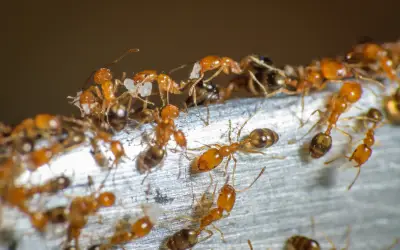Despite the fact that ants are often viewed as pests, annoying us with their relentless marching and unwanted presence in our homes and gardens, they have a significant role to play in medical research. Ants’ unique biology and social behaviour have led to numerous breakthroughs in the field, from the discovery of antibiotics to the development of new wound healing treatments. Their incredible strength and agility have also been studied to understand how they achieve these feats, leading to insights into human biomechanics and potential applications for biomaterials and biomechanical devices. Additionally, ants’ remarkable ability to regenerate lost body parts has been studied to understand how stem cells function in their bodies, potentially leading to regenerative medicine breakthroughs. So, even though ants may be a nuisance to us, they have a vital role to play in advancing our understanding of human biology and developing new treatments for diseases.
Ants have long been used as model organisms in scientific research due to their complex social behaviours, impressive cognitive abilities, and ecological importance. In recent years, ants have also begun to play a significant role in medical research, particularly in studying areas such as antimicrobial resistance, wound healing, and cancer therapy.
Unique ways in which ants are being utilized in medical research and the potential implications for human health.

One area of medical research in which ants have shown promise is in the study of antimicrobial resistance. Ants live in densely populated colonies where disease can spread rapidly, yet they have developed sophisticated mechanisms to combat infections. By studying the antimicrobial properties of ant colonies, researchers hope to gain a better understanding of how bacteria evolve resistance to antibiotics and develop new strategies to combat this growing threat to human health.
Another area of interest is the role of ants in wound healing. Ants have been observed using their saliva to clean and disinfect wounds, and recent research has shown that ant saliva contains several compounds that promote tissue regeneration and reduce inflammation. By understanding how ants are able to heal wounds so effectively, researchers may be able to develop new treatments for chronic wounds that are resistant to traditional therapies.
Finally, ants are also being studied for their potential role in cancer research. Some species of ants produce compounds that have been shown to inhibit the growth of cancer cells in laboratory studies. By isolating and studying these compounds, researchers hope to develop new cancer treatments that are more effective and less toxic than current therapies. Additionally, ants have shown promise in delivering targeted cancer therapy, as they can be trained to recognize and selectively attack cancer cells while leaving healthy cells unharmed.
In conclusion, ants are proving to be valuable allies in medical research, offering unique insights into antimicrobial resistance, wound healing, and cancer therapy. By studying the complex social behaviours and chemical defences of ants, researchers are uncovering new possibilities for improving human health. As our understanding of the role of ants in medical research continues to grow, we can look forward to the development of innovative treatments and therapies that could have a profound impact on the field of medicine.
And, if you’re still feeling annoyed by their presence, don’t hesitate to reach out to a professional pest control service to help eradicate them and restore your home to its ant-free state.




